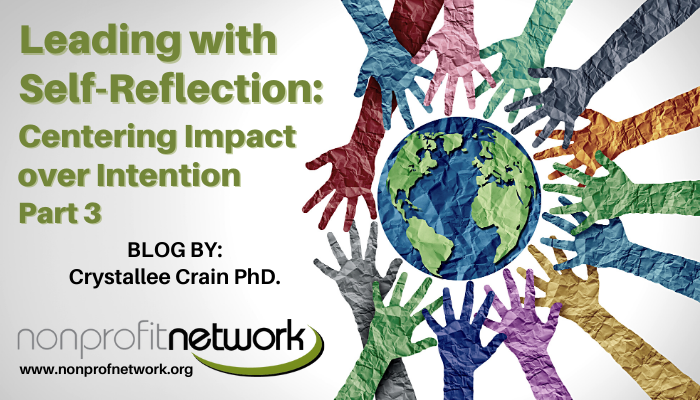
Leading with Self-Reflection: Centering Impact over Intention
Emotionally we know that our work in the nonprofit field often takes us beyond our job description. This is because the nature of our work relies on a responsiveness to the human condition. Ours and the communities we serve.
It only makes sense that our personal and professional development must also shift. I found the theory of cultural humility appealing years ago, 3 years ago I developed the cultural humility in practice training to strengthen our capacity to leave and serve while preventing unnecessary harm.
I’ve found that self-reflection and personal inquiry are crucial aspects of individual growth and development, and they play a vital role in building stronger communities, fostering intersectional solutions, and driving transformative leadership and culture change.
By delving into the depths of our own experiences, motivations, and biases, we gain a deeper understanding of ourselves, which in turn enables us to empathize with and appreciate the perspectives of others. We also know that generative self-critique can inform sound decision making on the micro and macro level - this can save lives. This introspective process is instrumental in shaping empathetic, inclusive, and resilient communities.
In Part 1: Why Cultural Humility - we shared the importance of a cultural humility lens for nonprofit leaders.
In Part 2: Assessing Our Own Cultural Humility - we explored scenarios that highlighted the opportunity for potential practice shifts based on the needs of community members, how our biases and perspectives could limit the care we’re able to provide in community.
In this blog, we will review a handful of the results of the Cultural Humility Assessment in the context of our future learning opportunity coming up at the end of this month (Jan 31, Feb 7). You can see the raw results of the survey here and you can register for our upcoming training event Here.
Self-Reflection and Personal Inquiry
Self-reflection involves examining one's thoughts, feelings, and experiences in a contemplative manner. It requires individuals to assess their beliefs, values, and behaviors with a critical eye, facilitating a greater self-awareness. Personal inquiry, on the other hand, involves asking meaningful questions about one's identity, purpose, and relationships. It encourages individuals to seek understanding and meaning in their experiences, leading to a more profound sense of self-discovery.
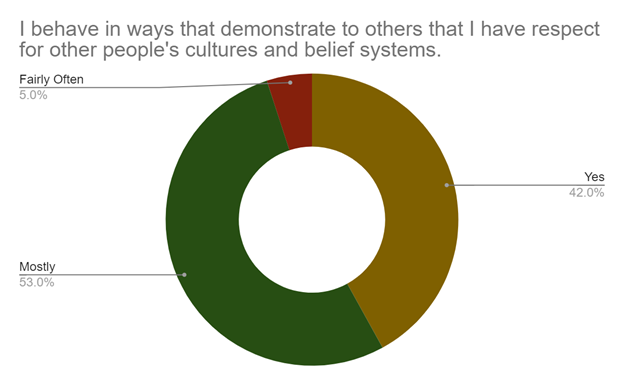
By examining this question, one can gain insight into how their actions and words impact those around them and strive to create a more respectful and inclusive environment.
Importance of Self-Reflection and Personal Inquiry
Self-reflection and personal inquiry are essential for personal growth and well-being. They enable individuals to identify areas for improvement, set meaningful goals, and cultivate a sense of purpose.
This heightened awareness that comes with personal inquiry can foster an environment of empathy, respect, and collective understanding within communities. It paves the way for open dialogue, constructive discourse, and the appreciation of differing viewpoints. As a result, communities benefit from increased cohesion, collaboration, and a shared sense of belonging.
It's important not to make assumptions about someone's identity because assumptions can lead to stereotyping and prejudice, which can be hurtful and disrespectful. Each person's identity is unique, and making assumptions can overlook their individual experiences, values, and beliefs.
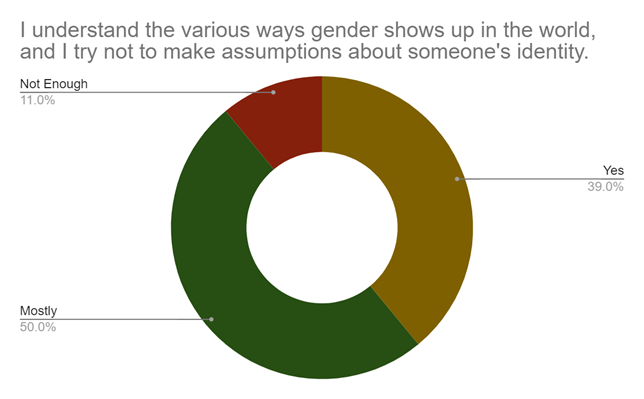
By avoiding assumptions, we can foster a more inclusive and respectful environment, valuing people for who they truly are rather than preconceived notions based on stereotypes.
Intersectional Solutions and Inclusivity
The work of cultural humility can lead to the inclusion and understanding of intersectionality of individual identities, acknowledging the complexities and nuances of human experiences. This awareness is critical in developing intersectional solutions that address the multifaceted challenges faced by our diverse communities. By considering the intersecting aspects of race, gender, sexuality, class, ability and more, individuals and communities can work towards solutions that are inclusive, equitable, and responsive to everyone's needs.
It is important to be conscious of your assumptions about other people. By dismantling assumptions and biased behavior, one can co-create a more inclusive and understanding environment. Assumptions make us all unsafe, and that awareness can help lead to different ways to communicate and engage with people you think like you and those you believe to be different from you.
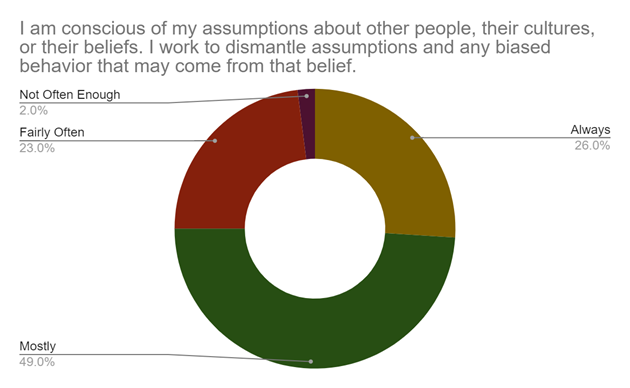
This active effort helps to break down harmful stereotypes and prejudices, contributing to more harmonious engagements.
Transformative Leadership and Culture Change
Leaders who engage in self-reflection and personal inquiry are better equipped to lead with authenticity, empathy, and a deep understanding of their own values and biases. These leaders are experienced and more adept at recognizing and addressing systemic inequalities, fostering an environment of accountability, and promoting a culture of continuous learning and growth. Transformative leadership driven by self-awareness and empathy can inspire others to embrace change, challenge the status quo, and champion initiatives that promote diversity, equity, inclusion, belonging, and accessibility (DEIBA).
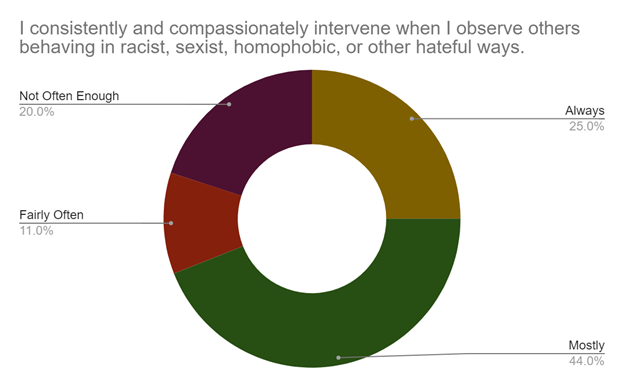
Consistently and compassionately intervening when observing hateful behavior is important because it sends a clear message that such behavior is unacceptable. By intervening, one demonstrates solidarity with the affected individual and helps create a safer and more inclusive environment. Additionally, it challenges harmful behavior and fosters a culture of empathy, respect, and social responsibility, ultimately contributing to the dismantling of harmful social norms and attitudes.
Conclusion...
When individuals engage in these practices, they are better equipped to build inclusive communities, develop intersectional solutions, and drive transformative leadership and culture change.
It's important to be aware of and speak about historical incidents because understanding these experiences is crucial for achieving social justice and equity. By acknowledging and addressing past injustices, we can work towards healing, reconciliation, and systemic change today. Speaking to these historical incidents allows us to educate others, empathize with those affected, and actively participate in shaping a more just and inclusive society. It allows for those most marginalized to not feel invisible in our workspaces and our efforts to bring hope and parity to our collective communities.
By cultivating a deeper understanding of ourselves and others, we can contribute to the creation of a more empathetic, equitable, and resilient world.
Don't miss this new 2-part workshop on Jan 31 and Feb 7 for an In-Depth Learning Opportunity and Experience in a Small Group Setting
Want even more? Click here to sign up for our weekly e-newsletter. Each week you'll get a link to the most recent news, workshops, and sector updates. We promise to respect your time and will not flood your inbox. We only send one e-newsletter each week and when any timely important announcements need to be made.

